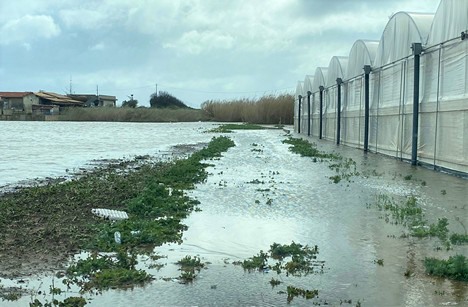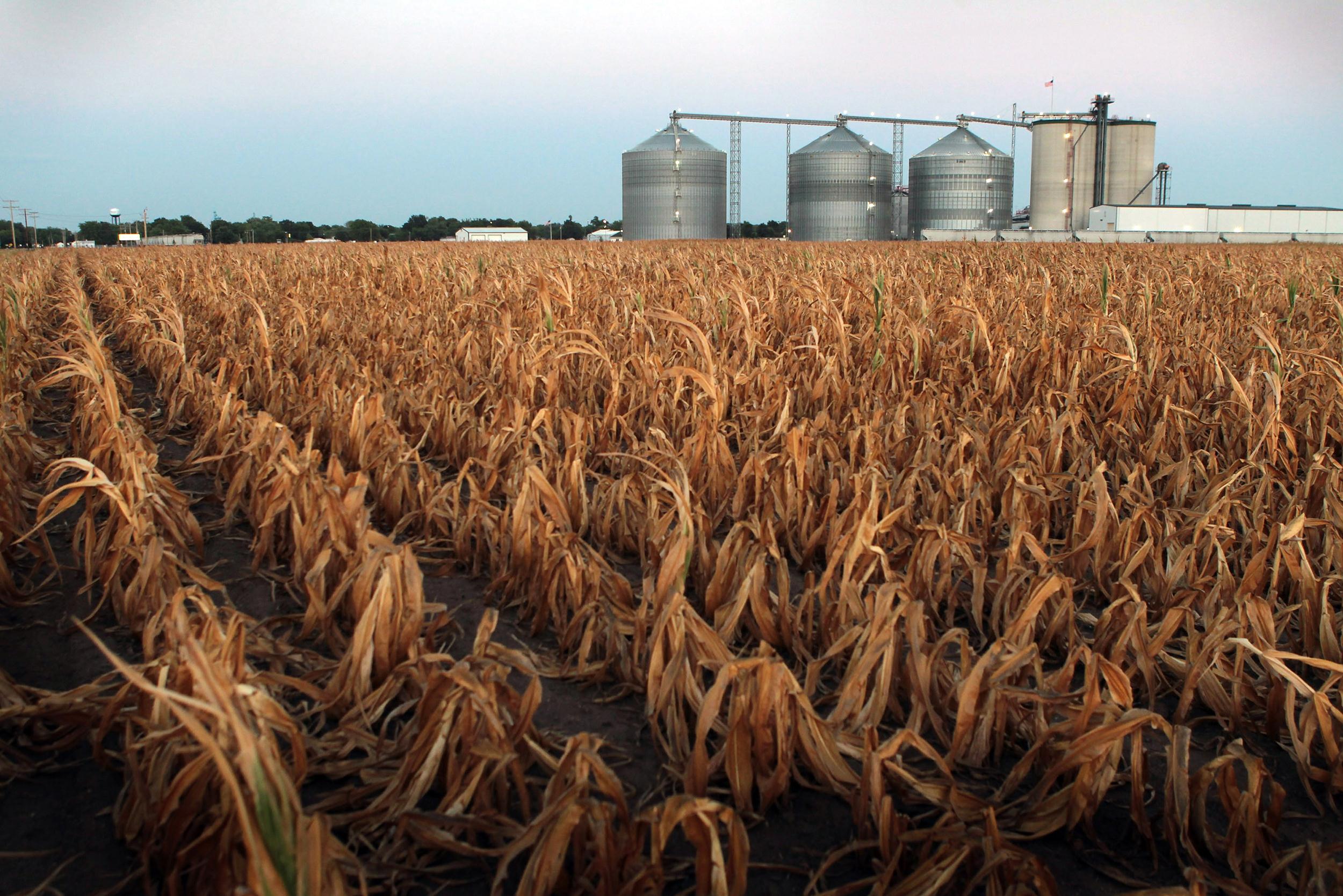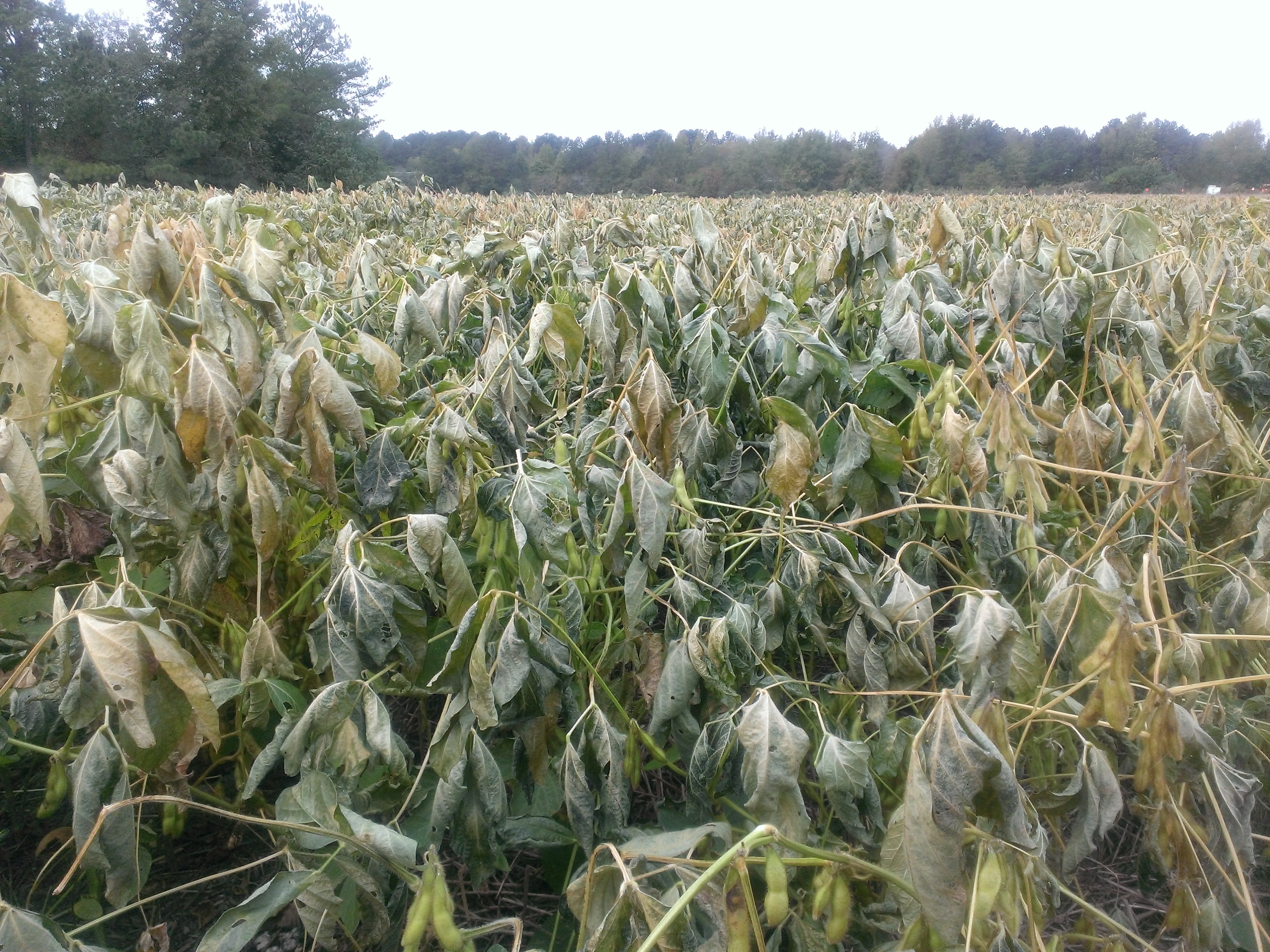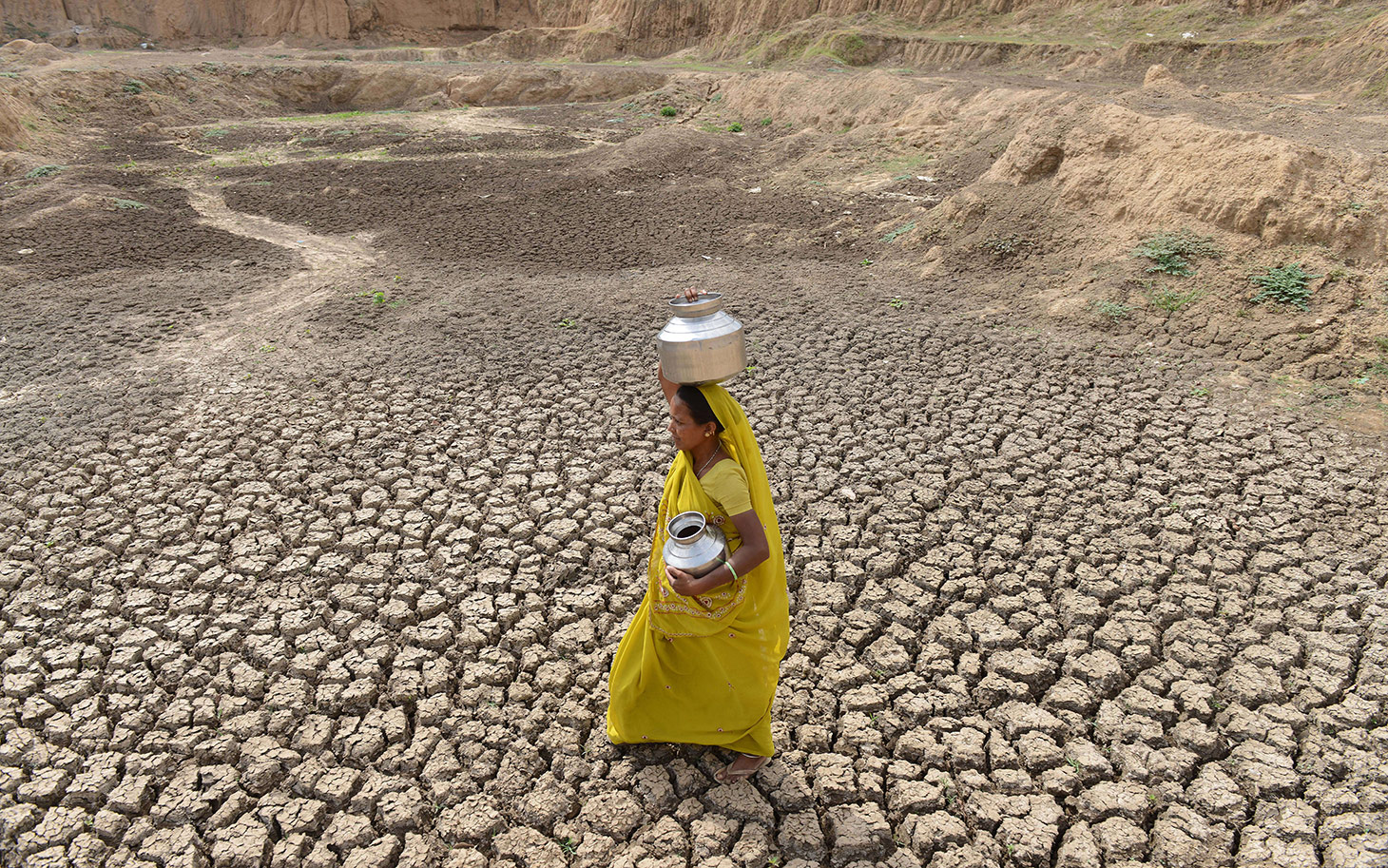 Among the 328 events listed in the EM-DAT database between 1998 and 2017, almost half were floods, which were responsible for the highest economic losses ($45.7 billion), more than losses resulting from storms, landslides, drought and natural disasters.
The agriculture sector bore a major share of the economic losses, according to the report, which said that despite the existence of crop insurance schemes, banks absorbed the brunt of the losses.
Less than 30% of the total crop area in India is covered by insurance. So banks are often obligated to restructure existing loans and provide fresh loans to farmers in disaster-hit areas.
“During FY 2012-2017 agriculture non-performing assets (NPAs) grew almost 2.5 times to reach INR602 billion(Rs 60,200 crore), with one of the likely reasons being crop failure from extreme weather events,” the report said.
The report comes at a time when Indian farmers are reeling under a spell of agrarian distress caused by bumper harvests coupled with declining prices of farm commodities, after suffering the impact of inadequate and uneven rainfall in previous years.
“The government made changes to the Pradhan Mantri Fasal Bima Yojana in 2016 like providing a higher premium subsidy to farmers to increase insurance coverage, but there were issues with implementation and estimation of losses which is why farmers didn’t take up the insurance scheme on a large scale,” said Charanjit Singh, lead author of the report.
“So whenever there is an extreme weather event, banks have to restructure existing loans in affected areas leading to NPAs. Our recommendation is that financial institutions in India develop a strategy to manage climate change-led risks,” he added.
Extreme weather events are also leading to significant losses in non-agricultural sectors.
ACT said Germanwatch, which works for the preservation of livelihoods, in its Global Climate Risk Index 2018 ranked India as the sixth more vulnerable country to extreme weather events. It trails five much smaller economies -- Haiti, Zimbabwe, Fiji, Sri Lanka and Vietnam.
“Both globally and in South Asia, the frequency and intensity of floods and droughts is increasing. In the coming years, the bulk of extreme weather events in India will be floods and heat stress.
“Agriculture will be badly affected. In Karnataka about 70% of crop is rain fed and more than half of the talukas have been affected by regular droughts. The situation is similar in Maharashtra. Farm distress will increase. Farmers need an insurance scheme that is implemented properly and which they can trust.
“They don’t trust the current schemes,” said NH Ravindranath, climate scientist from Indian Institute of Science (IISc).
Source - https://www.hindustantimes.com
Among the 328 events listed in the EM-DAT database between 1998 and 2017, almost half were floods, which were responsible for the highest economic losses ($45.7 billion), more than losses resulting from storms, landslides, drought and natural disasters.
The agriculture sector bore a major share of the economic losses, according to the report, which said that despite the existence of crop insurance schemes, banks absorbed the brunt of the losses.
Less than 30% of the total crop area in India is covered by insurance. So banks are often obligated to restructure existing loans and provide fresh loans to farmers in disaster-hit areas.
“During FY 2012-2017 agriculture non-performing assets (NPAs) grew almost 2.5 times to reach INR602 billion(Rs 60,200 crore), with one of the likely reasons being crop failure from extreme weather events,” the report said.
The report comes at a time when Indian farmers are reeling under a spell of agrarian distress caused by bumper harvests coupled with declining prices of farm commodities, after suffering the impact of inadequate and uneven rainfall in previous years.
“The government made changes to the Pradhan Mantri Fasal Bima Yojana in 2016 like providing a higher premium subsidy to farmers to increase insurance coverage, but there were issues with implementation and estimation of losses which is why farmers didn’t take up the insurance scheme on a large scale,” said Charanjit Singh, lead author of the report.
“So whenever there is an extreme weather event, banks have to restructure existing loans in affected areas leading to NPAs. Our recommendation is that financial institutions in India develop a strategy to manage climate change-led risks,” he added.
Extreme weather events are also leading to significant losses in non-agricultural sectors.
ACT said Germanwatch, which works for the preservation of livelihoods, in its Global Climate Risk Index 2018 ranked India as the sixth more vulnerable country to extreme weather events. It trails five much smaller economies -- Haiti, Zimbabwe, Fiji, Sri Lanka and Vietnam.
“Both globally and in South Asia, the frequency and intensity of floods and droughts is increasing. In the coming years, the bulk of extreme weather events in India will be floods and heat stress.
“Agriculture will be badly affected. In Karnataka about 70% of crop is rain fed and more than half of the talukas have been affected by regular droughts. The situation is similar in Maharashtra. Farm distress will increase. Farmers need an insurance scheme that is implemented properly and which they can trust.
“They don’t trust the current schemes,” said NH Ravindranath, climate scientist from Indian Institute of Science (IISc).
Source - https://www.hindustantimes.com
India - Losses doubled due to change in climate
24.01.2019 94 views Among the 328 events listed in the EM-DAT database between 1998 and 2017, almost half were floods, which were responsible for the highest economic losses ($45.7 billion), more than losses resulting from storms, landslides, drought and natural disasters.
The agriculture sector bore a major share of the economic losses, according to the report, which said that despite the existence of crop insurance schemes, banks absorbed the brunt of the losses.
Less than 30% of the total crop area in India is covered by insurance. So banks are often obligated to restructure existing loans and provide fresh loans to farmers in disaster-hit areas.
“During FY 2012-2017 agriculture non-performing assets (NPAs) grew almost 2.5 times to reach INR602 billion(Rs 60,200 crore), with one of the likely reasons being crop failure from extreme weather events,” the report said.
The report comes at a time when Indian farmers are reeling under a spell of agrarian distress caused by bumper harvests coupled with declining prices of farm commodities, after suffering the impact of inadequate and uneven rainfall in previous years.
“The government made changes to the Pradhan Mantri Fasal Bima Yojana in 2016 like providing a higher premium subsidy to farmers to increase insurance coverage, but there were issues with implementation and estimation of losses which is why farmers didn’t take up the insurance scheme on a large scale,” said Charanjit Singh, lead author of the report.
“So whenever there is an extreme weather event, banks have to restructure existing loans in affected areas leading to NPAs. Our recommendation is that financial institutions in India develop a strategy to manage climate change-led risks,” he added.
Extreme weather events are also leading to significant losses in non-agricultural sectors.
ACT said Germanwatch, which works for the preservation of livelihoods, in its Global Climate Risk Index 2018 ranked India as the sixth more vulnerable country to extreme weather events. It trails five much smaller economies -- Haiti, Zimbabwe, Fiji, Sri Lanka and Vietnam.
“Both globally and in South Asia, the frequency and intensity of floods and droughts is increasing. In the coming years, the bulk of extreme weather events in India will be floods and heat stress.
“Agriculture will be badly affected. In Karnataka about 70% of crop is rain fed and more than half of the talukas have been affected by regular droughts. The situation is similar in Maharashtra. Farm distress will increase. Farmers need an insurance scheme that is implemented properly and which they can trust.
“They don’t trust the current schemes,” said NH Ravindranath, climate scientist from Indian Institute of Science (IISc).
Source - https://www.hindustantimes.com
Among the 328 events listed in the EM-DAT database between 1998 and 2017, almost half were floods, which were responsible for the highest economic losses ($45.7 billion), more than losses resulting from storms, landslides, drought and natural disasters.
The agriculture sector bore a major share of the economic losses, according to the report, which said that despite the existence of crop insurance schemes, banks absorbed the brunt of the losses.
Less than 30% of the total crop area in India is covered by insurance. So banks are often obligated to restructure existing loans and provide fresh loans to farmers in disaster-hit areas.
“During FY 2012-2017 agriculture non-performing assets (NPAs) grew almost 2.5 times to reach INR602 billion(Rs 60,200 crore), with one of the likely reasons being crop failure from extreme weather events,” the report said.
The report comes at a time when Indian farmers are reeling under a spell of agrarian distress caused by bumper harvests coupled with declining prices of farm commodities, after suffering the impact of inadequate and uneven rainfall in previous years.
“The government made changes to the Pradhan Mantri Fasal Bima Yojana in 2016 like providing a higher premium subsidy to farmers to increase insurance coverage, but there were issues with implementation and estimation of losses which is why farmers didn’t take up the insurance scheme on a large scale,” said Charanjit Singh, lead author of the report.
“So whenever there is an extreme weather event, banks have to restructure existing loans in affected areas leading to NPAs. Our recommendation is that financial institutions in India develop a strategy to manage climate change-led risks,” he added.
Extreme weather events are also leading to significant losses in non-agricultural sectors.
ACT said Germanwatch, which works for the preservation of livelihoods, in its Global Climate Risk Index 2018 ranked India as the sixth more vulnerable country to extreme weather events. It trails five much smaller economies -- Haiti, Zimbabwe, Fiji, Sri Lanka and Vietnam.
“Both globally and in South Asia, the frequency and intensity of floods and droughts is increasing. In the coming years, the bulk of extreme weather events in India will be floods and heat stress.
“Agriculture will be badly affected. In Karnataka about 70% of crop is rain fed and more than half of the talukas have been affected by regular droughts. The situation is similar in Maharashtra. Farm distress will increase. Farmers need an insurance scheme that is implemented properly and which they can trust.
“They don’t trust the current schemes,” said NH Ravindranath, climate scientist from Indian Institute of Science (IISc).
Source - https://www.hindustantimes.com

2024 AgroInsurance International Conference: New Partners and Agenda updates
26.02.20242024 AgroInsurance International Conference will take place on June 3-5, 2024 in Belgrade, Serbia, at the Hyatt Regency Hotel. Planet Labs (USA) and GAF AG (Germany) are sponsors of our conference. Agremo (Serbia) has been confirmed as the Organization Partner. More partners and sponsors to be announced in March 2024.

Spain - 30% of La Palma's banana production has already been lost due to the advance of the lava
14.10.2021More than three weeks after the Cumbre Vieja volcano erupted, the lava that continues to flow from its interior continues to devastate everything in its path, destroying houses, infrastructure, and banana plantations. The production of Platanos de Canarias is the economic engine of the island, accounting for 50% of its GDP and 30% of the jobs on the island.

USA - Widespread root rot crop loss in 2022-23
Root rot has been established in some pea and lentil fields across North Dakota and Montana, with widespread crop loss observed in 2022-23. To help, North Dakota State University (NDSU) research is focusing on what farmers can do to reduce their root rot risk as they begin seeding their pulse crops this spring.

UAE - Unprecedented floods destroy greenhouses
The United Arab Emirates experienced a "historic climatic event", according to the National Meteorological Center, which stated, "The UAE experienced the heaviest rainfall in 75 years, and the "Khatm Al-Shakla" area in Al Ain received 254.8 mm of rain in less than 24 hours." That's the equivalent of two years' rainfall by the country's standards.

Philippines - P184-million crop loss to El Niño reported
Agricultural crops worth approximately P184.63 million suffered damage, while 3,427 farmers grappled with the effects of the El Niño phenomenon. Sylvia Dela Cruz, the provincial agriculturist of Capiz, reported that data from 13 municipalities showed 3,115.11 hectares of rice land impacted, with 852.41 hectares totally damaged and 2,272.70 hectares partially damaged.

Canada - The B.C. agriculture sector continues to face relentless challenges, one after another
Facing increasing drought, alarming climate change, high levels of food insecurity and a myriad of distinct microclimates in all parts of the province, farmers are continually searching for ways to mitigate their obstacles.

Cocoa prices hit records as West African yields decline
Cocoa prices broke $10,000 per ton for the first time in March, amid disease outbreaks and destructive weather patterns in West Africa. Cocoa futures were as high as $10,080 in New York at the close of the first quarter, having more than doubled this year – due to expectations of a shortage of cocoa beans, the raw material used to make chocolate.

Bangladesh - Climate change in the north-west
The north-west — Rajshahi and Rangpur divisions — of Bangladesh produces more than one-third of the country’s staple food, especially boro rice. The region has 40 per cent of the country’s total irrigated area and 30 per cent of the net cultivable area, with the highest average rice yield.

Canada - Blossoms arrive early, farmers fearful of April frost
All eyes are on the short-term weather forecast for local stone fruit farmers thanks to Mother Nature’s unpredictable ways. In a strange twist that saw this year’s mild winter help create an early explosion of healthy blooms over the past week, forecasted low overnight temperatures over the next two weeks could create a disastrous situation.

USA - USDA reminds agricultural producers to report damage or losses following inclement weather
During the spring time of the year we do see inclement weather conditions, something that has occurred quite a bit over the past few weeks across the country. Due to this, the USDA Farm Service Agency (FSA) wants to remind agricultural producers to report damage or losses following inclement weather.



